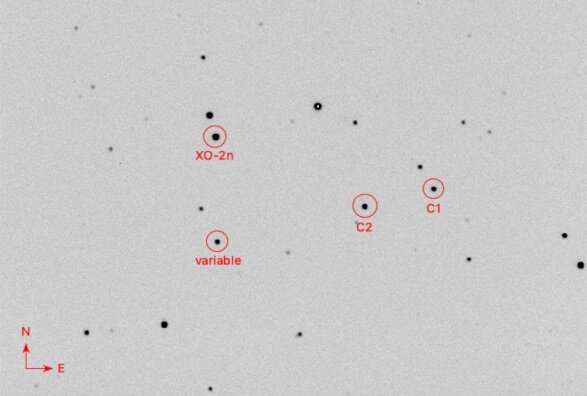July 7, 2022 report
Turkish astronomers discover new short-period pulsating variable star

Astronomers from the Istanbul University in Turkey report the finding of a new short-period pulsating variable star during observations of the field of exoplanet host star XO-2. The newly detected object is most likely a Delta Scuti type variable with a pulsation period of less than one hour. The discovery was detailed in a paper published June 29 on arXiv.org.
Detecting and studying variable stars could offer important hints into aspects of stellar structure and evolution. Investigation of variables could be also helpful for better understanding of the distance scale of the universe.
Delta Scuti stars are pulsating variables with spectral types between A and F, named after the Delta Scuti variable in the constellation Scutum. They exhibit radial and non-radial pulsations spanning periods from 20 minutes to eight hours. Studying pulsation behavior of Delta Scuti variables could help us advance our knowledge about stellar interiors.
Now, a team of astronomers led by Mustafa Turan Sağlam has found a new variable that appears to be of Delta Scuti type. They used the 0.4m Schmidt-Cassegrain telescope (IST40) of the Istanbul University Observatory to observe the exoplanet host star XO-2 within a research program investigating transit timing variations. Afterward, comprehensive follow-up photometric observations of the newfound star have been conducted to confirm its variability.
"We present the detection of a new variable in the field of exoplanet host star XO-2. The new variable has been observed in 10 nights with different standard photometric filters besides white light observations," the researchers wrote in the paper.
The pulsation period of the new variable was measured to be approximately 0.95 hours, while its mass is estimated to be between 1.5 and 1.7 solar masses. It was found that the variable is of spectral type A7 and has an effective temperature of about 7,725 K. These properties are typical for Delta Scuti stars.
Moreover, the shape of the light curves of the newly detected variable and the automated classification based on machine learning algorithms support the Delta Scuti scenario. The astronomers calculate that the probability that this hypothesis is true is around 78%.
The study also found that the investigated star has a luminosity at a level of about 6.93 solar luminosities and an absolute magnitude in V-band of approximately 2.76. The distance to this variable, based on the data from ESA's Gaia satellite, was estimated to be around 5,613 light years.
Summing up the results, the researchers noted that further observations of this variable are required in order to definitely confirm its nature and to shed more light on pulsation behavior.
"Additional ground-based observations can be coupled together with TESS [Transiting Exoplanet Survey Satellite] short cadence observations to perform a deeper study of the new variable," the authors of the study wrote.
More information: Mustafa Turan Sağlam et al, Discovery of a Short Period Pulsator from Istanbul University Observatory. arXiv:2206.14632v1 [astro-ph.SR], arxiv.org/abs/2206.14632
© 2022 Science X Network




















